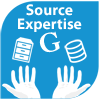 Insight 2 from Research Focus - Why you should aim higher and engage more
Insight 2 from Research Focus - Why you should aim higher and engage more
Jinfo Blog
24th June 2016
Abstract
In the second of the insights from Jinfo's Research Focus, "Source Expertise - What It Means in a Google World", director of research, Robin Neidorf, identifies what you need to do to engage more effectively with decision-makers to ensure source expertise becomes a "must have" element of every strategic discussion.
Item
 Move your information service and expertise from "nice to have" to "must have": take a hard look at your stakeholder engagement plan and re-balance it to focus primarily on decision-makers in key departments, rather than on direct users of your services.
Move your information service and expertise from "nice to have" to "must have": take a hard look at your stakeholder engagement plan and re-balance it to focus primarily on decision-makers in key departments, rather than on direct users of your services.
For years, Jinfo has been working with customers on stakeholder mapping, as a first step to creating and improving their communications and engagement activities. Most create maps that focus on engaging with direct users of their services, and then create marketing plans to increase demand.
Yet we learned in the Research Focus, "Source Expertise - What It Means in a Google World", that the most successful information services focus their engagement efforts not on direct users but on decision-makers in strategic areas of the business: analytics, IT, procurement, HR, training, and legal. When your expertise is visible to and valued by these stakeholders, it becomes a "must have" element of every strategic discussion.
It's easier to attract more users than it is to influence decision-makers. What's at stake is the relevance and value of your expertise to the business, now and in the future.
How can you engage more effectively with decision-makers?
- Review and complete your stakeholder map again, identifying where decision-makers in analytics, IT and other critical areas of the business stand in relation to you. Create a quarterly and monthly plan for engagement, and decide what less-valuable tasks will need to be relinquished for this to happen.
- Articulate the value of source expertise. You're not (just) providing information services; your expertise, combined with that of your peers in related areas of the business, enables the organisation to maximise information as an asset.
- Leverage informal interactions as well as formal meetings, projects and collaborative efforts. Peers in these key areas of the business need to develop an inherent understanding of how source expertise makes their ideas succeed. Embedding this perspective in their consciousness takes time, and the informal conversations and connections (meeting periodically for lunch; checking in on important projects even if not part of them; generating peer-to-peer discussion on critical topics facing the business) moves some of this education to an environment where less is at stake and peers can be more receptive.
- Coach and train for greater visibility on the part of members of your team. Success in this challenge demands that source experts see themselves as experts and present themselves as experts - speaking up in meetings, making noise about source-related opportunities and risks, and communicating on an advisory level rather than getting down in the weeds.
Many heads of information services find themselves in the awkward position of being prized by direct users but almost invisible to decision-makers. Only a focused, strategic engagement plan pitched directly at the right stakeholders and the right level can change this dynamic.
These items from the Research Focus "Source Expertise - What It Means in a Google World" will help:
- Information Professionals Need to Know About Big Data
- Introducing Consultants to Information Research
- What You Can "Own" and What You Can Influence
- Webinar recording (available to all Jinfo Subscribers): Source Expertise and Your Value to the Business
The main lessons learned from this three-month Research Focus, plus a thematic index to all content published, are listed in the report Insights and Actions from the Research Focus "Source Expertise - What It Means in a Google World", visit the Research Focus page to get your copy.
- Blog post title: Insight 2 from Research Focus - Why you should aim higher and engage more
- Link to this page
- View printable version
- Information Professionals Need to Know About Big Data
Friday, 27th May 2016 - Introducing Consultants to Information Research
Thursday, 14th April 2016
- Insight 3 from Research Focus - What you should invest in first for highest value
Monday, 27th June 2016 - Insight 1 from Research Focus - What you should sacrifice to focus on source expertise
Wednesday, 22nd June 2016
Register for our next Community session:

Team roles and AI
26th February 2026
Latest on our YouTube channel:
Read on the Blog:
January 2026 update
7th January 2026
- How BASF puts knowledge at the centre of innovation
28th January 2026 - All recent Subscription content
22nd January 2026 - Should you sign up for a product in beta?
13th January 2026
- Licensed content and AI (Community) 24th March 2026
- BASF's knowledge platform demo (Community) 10th March 2026
- Team roles and AI (Community) 26th February 2026